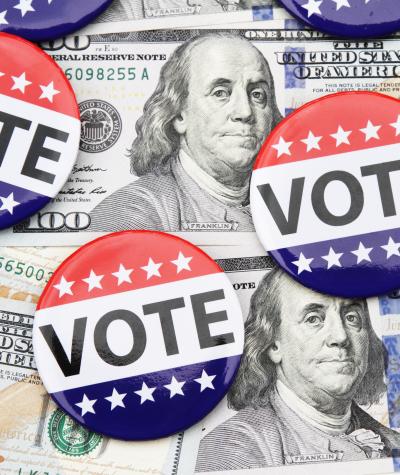As 2024 presidential candidates look to build support for their respective campaigns among voters, “soft money” — or funds raised outside the scope of federal campaign finance laws — is already having a major impact on the race for the White House. Because soft money doesn’t comply with federal campaign finance laws, it undermines the crucial transparency and anticorruption goals of those laws.
Voters have a right to know who is trying to influence their vote and their government and to rest assured that the political process is fair and free of corruption. But when candidates bolster their campaign efforts with soft money, this undermines the critical protections that our campaign finance laws maintain and creates a system in which the voices of ordinary voters are drowned out by the wealthy few.
Prior to the passage of the Bipartisan Campaign Reform Act (sometimes called BCRA or McCain-Feingold) in 2002, federal candidates and political parties often raised money through nonfederal entities, which are subject to state or local laws that may be less stringent and thus offer fewer transparency and anticorruption protections than federal campaign finance laws.
Congress passed BCRA to end this widespread and corrupt practice. Since its passage, federal candidates are prohibited from raising or spending funds that do not comply with federal contribution limits, source prohibitions, and reporting requirements — such as money raised through state committees — in their pursuit of federal office.
Those who use soft money in federal campaigns despite these restrictions are blatantly violating the law. But in recent years, lax enforcement of the laws banning soft money by the Federal Election Commission (FEC) — the independent regulatory agency responsible for civil enforcement of federal campaign finance law — have produced an environment where soft money is having a growing impact on our elections.
Since the Supreme Court’s 2010 decision in Citizens United v. FEC effectively launched a wave of outside spending, primarily through the “super PAC” — a type of political committee that can raise and spend unlimited amounts of money, including money from corporations and wealthy special interests — nearly every presidential candidate over the past ten years has been supported by (and typically works in tandem with) a super PAC.
While super PACs have continued to grow in scope and power over the past decade, their use as a vehicle for federal candidates to infuse illegal soft money into federal elections is a new and troubling phenomenon.
For example, leading 2024 presidential candidates former President Donald Trump and Florida Governor Ron DeSantis have openly flouted the laws banning soft money to fund the super PACs backing their own respective campaigns.
CLC and NRDC Action Votes filed a complaint with the FEC this past May against Trump for illegally transferring $60 million in soft money from his leadership PAC, Save America, to the super PAC Make America Great Again Inc., which spent millions backing 2022 congressional candidates endorsed by Trump and is now the primary super PAC supporting his presidential campaign.
CLC also filed a complaint with the FEC against DeSantis, who illegally transferred $80 million in May 2023 from the Florida state PAC Friends of Ron DeSantis to the federal super PAC Never Back Down, which serves as the primary super PAC supporting his candidacy.
These illegal soft money transfers were made when Trump and DeSantis were already federal candidates, i.e., after they decided to run for office and had raised or spent over $5,000 in furtherance of that goal.
Congress enacted contribution limits, source prohibitions, and reporting requirements to limit opportunities for corruption in our campaign finance system, protect against a “pay-to-play” style of politics, and ensure transparency for voters to know who’s spending money to influence their vote.
To preserve and advance these goals as voters prepare to cast their ballots, the FEC needs to do its job and robustly enforce federal campaign finance laws, including the soft money prohibition, and send a clear message that candidates will be held accountable for violations in the 2024 election and beyond.

